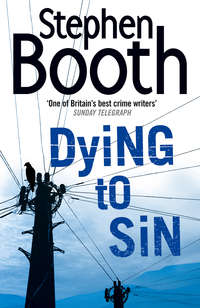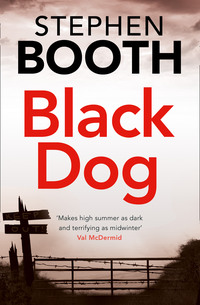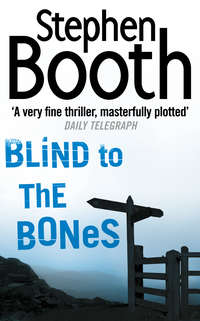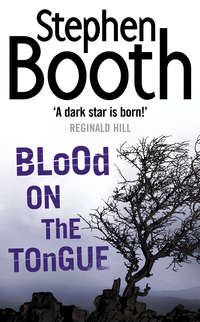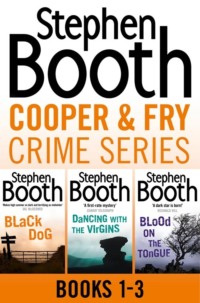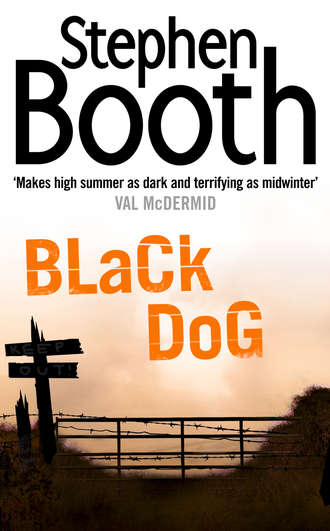
Полная версия
Black Dog
Cooper passed a stretch of collapsed wall, where a length of electric fence had been erected to keep the cattle away until someone skilled in dry-stone walling could be found to repair it. Before the cows’ curiosity could lead them to follow him, Cooper had already reached the next gate. He skirted another field and ran up a farm track paved with stones and broken rubble.
The steepness of the slope was increasing steadily now on the last few hundred yards, until Cooper began to feel as though he was back on the Cuillins again. Wragg was dropping further and further behind, slowing to a walk, using his arms against his knees to boost himself up the steeper sections.
He was carrying too much upper body weight, thought Cooper, and hadn’t developed the right muscles in his thighs and calves for hill climbing. Some of the old people who had lived in these hill villages all their lives would have passed the young PC with ease.
Finally, Cooper reached the high, dark wall at the corner of the graveyard at St Edwin’s Church. The church seemed to have been built on a mound, standing well above the village street at the front and presenting an elevation from the bottom of the valley like the rampart of a castle wall. The square Norman tower stood stark against the sky, tall and strangely out of proportion to the shortened nave, giving the church the appearance of a fallen letter ‘L’.
The surface of the churchyard was so high that Cooper thought the bodies buried there must be almost on his eye level, if only he could see through the stones of the wall and the thick, dark soil to where the oak caskets lay rotting.
The church was surrounded by mature trees, horse chestnuts and oaks, and two ancient yews. The damp smell of cut grass was in the air, and as Cooper passed the churchyard, climbing now towards the back of a row of stone cottages, a man in a red check shirt with his sleeves rolled up looked over the wall at him from the side gate. He was leaning on a big petrol lawn mower, pausing between a swathe of smoothly mown grass and a tussocky area he hadn’t yet reached. He gazed at the running man with a grimace of distaste, as if the evening had been disturbed by something particularly unpleasant.
At the first of the cottages, a woman was in her garden with a watering can, tending the flower beds on the side where they were in the shade of the cottage wall. She held the watering can upright in a gloved hand as she watched Cooper trying to catch his breath to ask directions. He found he was gasping in the heady smells of honeysuckle and scented roses freshly dampened with water. Behind him, the lawn mower started up again in the churchyard, and a small flock of jackdaws rose protesting from the chestnuts.
‘Dial Cottage?’
The woman stared at him, then shook her head almost imperceptibly, unwilling to spare him even that effort. She turned her back ostentatiously, her attention on a miniature rose with the palest of yellow flowers. On the wall in front of Cooper was a sign that said: ‘No parking. No turning. No hikers’.
Two cottages up, he found an old woman sitting in a garden chair with a Persian cat on her knee, and he repeated his question. She pointed up the hill.
‘Up to the road, turn left and go past the pub. It’s in the row of cottages on your left. Dial Cottage is one of those with the green doors.’
‘Thank you.’ With a glance at the PC still struggling up the track, Cooper ran on, glad to have tarmac under his feet at last as he approached the road.
Moorhay was off the main tourist routes and had little traffic most of the time, with no more than an occasional car coasting through towards Ladybower Reservoir or the show caverns in Castleton. A small pub called the Drover stood across the road, with two or three cars drawn up on the cobbles in front. According to the signs, it sold Robinson’s beer, one of Ben Cooper’s favourites. Right now, he would have died for a pint, but he couldn’t stop.
He passed a turning called Howe Lane, near a farm entrance with a wooden-roofed barn and a tractor shed. A sign at the bottom of the track said that the farmhouse itself provided bed and breakfast. Trees overhung the road as it wandered away from the village. In the distance, he glimpsed a shoulder of moor with a single tree on its summit.
Two hundred yards from the church was a long row of two-storey cottages built of the local millstone grit, with stone slate roofs and small mullioned windows. They had no front gardens, but some had stone troughs filled with marigolds and petunias against their front walls. One or two of the cottages had plain oak plank doors with no windows. The doors were painted a dark green, with lintels of whitewashed stone tilted at uneven angles.
By the time Cooper found which of them was Dial Cottage, the perspiration was running freely from his forehead and the back of his neck and soaking into his shirt. His face was red and he was breathing heavily when he knocked on the door. He could barely bring himself to speak when it was answered.
‘Detective Constable Cooper, Edendale Police.’
The woman who opened the door nodded, not even looking at the warrant card held in his sticky palm.
‘Come in.’
The old oak door thumped shut, shutting out the street, and Cooper blinked his eyes to readjust them to the gloom. The woman was about his own age, maybe twenty-seven or twenty-eight. She was wearing a halter-necked sun top and shorts, and her pink limbs immediately struck him as totally out of place in the dark interior, like a chorus girl who had wandered into a funeral parlour. Her hair shone as if she had brought a bit of the sun into the cottage with her.
They stood in a narrow hallway, made even narrower by a heavy mahogany sideboard loaded with cut-glass vases and a fruit bowl, all standing on lace mats. In the middle was a colour photograph of a large family group, taken at the seaside somewhere. Recently applied magnolia woodchip wallpaper could not disguise the unevenness of the walls underneath. An estate agent would have called it a charming period look.
Cooper stood still for a moment, fighting to get back his breath, his chest heaving. He wiped the back of his hand across his brow to stop the trickles of sweat running into his eyes.
‘We had a report at the station,’ he gasped. ‘A phone call.’
‘It’s Ben Cooper, isn’t it?’
‘That’s right.’ He looked at the young woman again, recognition dawning only slowly, as he found it did when you saw someone out of their familiar surroundings.
‘Helen? Helen Milner?’
‘That’s it. I guess I’ve changed a bit since the sixth form at Edendale High.’
‘It was a few years ago.’
‘Nine years, I suppose,’ she said. ‘You’ve not changed much, Ben. Anyway, I saw your picture in the paper a while ago. You’d won a trophy of some sort.’
‘The Shooting Trophy, yes. Look, can we –?’
‘I’ll take you through.’
‘Do you live here then?’
‘No, it’s my grandparents’ house.’
They stepped through into a back room, hardly less gloomy than the hallway despite a window looking out on to the back garden. There was a 1950s tiled fireplace in the middle of one wall, scattered with more photographs and incongruous holiday mementoes – a straw donkey, a figure of a Spanish flamenco dancer, a postcard of Morocco with sneering camels and an impossibly blue sea. Above the fireplace, a large mirror in a gilt frame reflected a murky hunting print on the opposite wall, with red-coated figures on horseback galloping into a shadowy copse in pursuit of an unseen quarry. Cooper smelled furniture polish and the musty odour of old clothes or drawers lined with ancient newspapers.
There were two elderly people in the room – a woman wearing a floral-patterned dress and a blue cardigan sitting in one armchair, and an old man in a pair of corduroy trousers and a Harris wool sweater facing her in the other chair. They both sat upright, stiff and alert, their feet drawn under them as if to put as much distance between themselves as they could.
In front of the empty fireplace stood a two-bar electric fire. Despite the warmth of the day outside, it gave the impression of having been recently used. Cooper, though, was glad of the slight chill in the room, which had begun to dry the sweat on his face as the two old people turned towards him.
‘It’s Ben Cooper, Granddad,’ said Helen.
‘Aye, I can see that. Sergeant Cooper’s lad.’
Cooper was well used to this greeting, especially from the older residents around Edendale. For some of them, he was merely the shadow of his father, whose fame and popularity seemed eternal.
‘Hello, sir. I believe somebody phoned the station.’
Harry didn’t answer, and Cooper was starting to form the idea that the old boy might be deaf when his granddaughter stepped in.
‘It was me, actually,’ said Helen. ‘Granddad asked me to.’
Harry shrugged, as if to say he couldn’t really be bothered whether she had phoned or not.
‘I thought it’d be something you lot would want to know about, like as not.’
‘And your name, sir?’
‘Dickinson.’
Cooper waited patiently for the explanation. But it came from the granddaughter, not from the old man.
‘It’s in the kitchen,’ she said, leading the way through another door. An almost brand-new washing machine and a fridge-freezer stood among white-painted wooden cupboards, with an aluminium sink unit awkwardly fitted into place among them. Neither of the old people followed them, but watched from their chairs. The rooms were so small that they were well within earshot.
‘Granddad found this.’
The trainer lay on a pine kitchen table, lumpy and grotesque among the bundles of dried mint and the brown-glazed cooking pots. Someone had put a sheet from the Buxton Advertiser underneath it to stop the soil that clung to its rubber sole from getting on to the surface of the table. The trainer lay in the middle of an advertising feature for a new Cantonese restaurant, its laces trailing across a photograph of a smiling Chinese woman serving barbecued spare ribs and bean sprouts. On the opposite page were columns of birth and death notices, wedding announcements and twenty-first birthday greetings.
Cooper wiped his sweaty palms on his trousers and took out a pen. He gently prised open the tongue of the trainer to look inside, careful not to disturb the soil that was starting to dry and crumble away from the crevices in the sole.
‘Where did you find this, Mr Dickinson?’
‘Under Raven’s Side.’
Cooper knew Raven’s Side. It was a wilderness of rocks and holes and tangled vegetation. The search parties had been slowly making progress towards the cliff all afternoon, as if reluctant to have to face the task of searching it, with the expectation of twisted ankles and lacerated fingers.
‘Can you be more specific?’
The old man looked offended, as if he had been accused of lying. Cooper began to wonder why he had thought it was cooler inside the cottage. Despite the open windows, there was no breath of air in the kitchen. The atmosphere felt stifling, claustrophobic. The only bit of light seemed to go out of the room when Helen went to answer a knock at the door.
‘There’s a big patch of brambles and bracken down there, above the stream,’ said the old man. ‘It’s where I walk Jess, see.’
Cooper was surprised by a faint scrabbling of claws near his feet. A black Labrador gazed up at him from under the table, responding hopefully to the sound of its name. The dog’s paws were grubby, and it was lying on the Eden Valley Times. The sports section, by the look of it. Edendale FC had lost the opening match of the season.
‘Was there just the trainer? Nothing else?’
‘Not that I saw. It was Jess that found it really. She goes after rabbits and such when she gets down by there.’
‘OK,’ said Cooper. ‘We’ll take a look in a minute. You can show me the exact spot.’
Helen returned, accompanied by an exhausted PC Wragg.
‘Is it … any use?’ she asked.
‘We’ll see.’ Cooper took a polythene bag from his back pocket and carefully slid the trainer into it. ‘Would you wait here for a while, please? A senior officer will probably want to speak to you.’
Helen nodded and looked at her grandfather, but his expression didn’t alter. His face was stony, like a man resigned to a period of necessary suffering.
Cooper went back into the road and pulled out his personal radio to contact Edendale Divisional HQ, where he knew DI Hitchens would be waiting for a report. He held the polythene bag up to the light, staring at its contents while he waited for the message to be relayed.
The trainer was a Reebok, size-five, slim-fit. And the brown stains on the toe looked very much like blood.
4
The E Division Police Headquarters in Edendale had been new once, in the 1950s, and had even earned their architect a civic award. But in the CID room, fifty years of mouldering paperwork and half-smoked cigarettes and bad food had left their mark on the walls and their smell in the carpets. The Derbyshire Constabulary budget had recently stretched sufficiently to decorate the walls, replace the window frames, and install air conditioning in some of the offices. They had also replaced the old wooden desks with modern equivalents more in keeping with the computer equipment they carried.
DC Diane Fry was reading the bulletins. She had started off by catching up with the fresh ones for the day, then had continued casting back over recent weeks. Her intention was to make herself familiar with all the current enquiries in the division. Although she had been in Edendale nearly two weeks, she still felt as new as the white glosswork that for some reason was refusing to dry properly on the outside wall near the window. All the windows on this side of the building looked down on Gate C and the back of the East Stand at Edendale Football Club, a team struggling in the lower reaches of one of the pyramid leagues.
The priority problem of the moment was car crime at local tourist spots. From the weary tone of some of the memos Fry came across, it sounded as though it always was the priority problem in E Division at this time of year. Many thousands of visitors were drawn into the Peak District National Park during the summer, bringing with them what appeared to be their own crime wave, like the wake trailing behind a huge cruise liner. These visitors left their cars at remote spots, in makeshift car parks on rough ground, in abandoned quarries and on roadside verges. The cars were invariably full of cameras and binoculars and purses stuffed with cash and credit cards, and God knows what else. At the same time, travelling criminals from the big conurbations around Sheffield in the east and Manchester in the west were touring the Peak District looking for just such victims. A few minutes with an unattended vehicle and they were away back to their cities, leaving a trail of distraught visitors and ruined holidays.
It presented an apparently insoluble problem. It was impossible to get the message across to the car owners, since they were a constantly changing flood – here one day, then moving on the next, to be replaced by another group of visitors. It was impossible for the police to keep surveillance on vulnerable sites with the resources available; it was feasible only to identify possible perpetrators and ask neighbouring forces to keep them under observation. It was called living in hope.
Diane Fry looked across the room at DS Rennie. He was on the phone, and had been for some time. She couldn’t hear what he was saying, but she was fairly sure he hadn’t yet taken a single note with the ballpoint pen he was chewing. He was thick-shouldered and thick-necked, a veteran prop forward in the divisional rugby team, as she had learned from his conversation with one of the other DCs. She also knew that Rennie’s first name was David, and that he was married with two children in their early teens.
She had soon become aware of his sly sideways appraisal, a slithering of the eyes towards her when he thought she wasn’t looking. She had observed this in the past to be a common tentative first manoeuvre towards a junior female colleague, designed to culminate in an office affair. Many men, of course, never got past this first sign – it was more an indication of hope than intention. But there were others who were more of a nuisance, and Fry couldn’t tell just yet which Rennie was. It was helpful, though, to have the early warning, so that she could decide on her own terms when the time was right to put him down. Affairs with colleagues were not on her agenda. Not at all.
She could see Rennie was not making the effort to appear busy, even though there was a DCI somewhere in the building and liable to appear in the CID room at any moment.
‘Sarge?’ said Fry, when at last he put the phone down.
Rennie looked round, as if surprised that she was still there. Then he smiled, contorting his face until it was almost a wink. His tie was something dark green, with a small gold crest, and his suit was a good cut for his heavy shoulders, but not recently cleaned. He pulled out a bar of his habitual chewing gum, which Fry had guessed might mean he was a reformed smoker.
‘What can I do for you, Diane?’
‘This project group looking at the auto crime figures.’
‘Yeah?’
‘I wondered if a check had been done on the computer. Matching up locations and timings. An analysis of MOs. We could set up a computer model.’
‘Ben Cooper usually does that,’ said Rennie. ‘You’d better not mess with the computer until you’ve asked him about it.’
‘A computer model could come up with a set of predictions, suggest target locations. It’s worth a try, Sarge.’
‘I told you, speak to Ben. They’ve got him out at Moorhay, but he should be back in the office later, thank God.’
Fry had already heard Ben Cooper’s name several times during her first week in Edendale. Apparently he was some paragon of all the virtues who knew everything. DC Cooper knew the area like the back of his hand, they said. He knew all the local villains and even their families, they said. He knew how all the systems in the CID office worked, too. He knew exactly how to fill in the vast quantities of paperwork that baffled other detectives. Now, apparently, he was the only one who knew how to use the computers. But Diane Fry had an information technology qualification to her name, and she had done a course on intelligence data analysis at the National Crime Faculty in Bramshill. At the first opportunity, she would show them who knew how to use the computers around here.
For now, though, she decided to try another tack.
‘Someone from the NCIS did a paper on this problem a few months ago. It was mentioned when I was at Bramshill.’
‘Really?’
Rennie sounded uninterested.
‘The National Criminal Intelligence Service.’
‘I know what the NCIS is, thanks.’
‘I wondered if someone had researched it. I can’t see any mention in the paperwork. Maybe the project group have followed it through?’
‘I doubt it.’
‘I’ll look it up, if you like, Sarge.’
Rennie looked sour, pulled at his tie, scrabbled about on his desk for a bit of paper and picked up the phone to dial another number.
‘Shall I, Sarge?’
‘Oh, if you like.’
Fry made a note for herself in her notebook and asterisked it. Then she put the car crime reports aside and picked up that morning’s bulletin on the missing girl, Laura Vernon. She had already read it once and had memorized its admittedly sketchy details.
Her memory was excellent for jobs like this. She knew exactly what the girl had been wearing when last seen, down to the blue pants and the size-five slim-fit Reeboks. If she was the first officer to come across any of these items, she knew she would recognize them straightaway. But she would have to be allocated to the search first, of course.
All available hands had already been called to the task of finding Laura Vernon. All hands, that was, except Detective Constable Diane Fry and Detective Sergeant David Rennie. Fry was new to the division, of course, but what had Rennie done wrong? He was currently in charge of day-to-day crime in E Division, and Fry constituted his staff. It wasn’t a combination that looked likely to crush any crime waves. At this moment, they weren’t even trying.
Fry got up from her desk and walked over to check the action file on the Laura Vernon enquiry. Although the enquiry was less than forty-eight hours old, the file was already getting thick. The apparatus of a major enquiry was beginning to swing into operation, even though it hadn’t yet been designated a murder enquiry – not until a body was found. Teenage girls ran away from home all the time, of course, and generally turned up a few days later, hungry and shamefaced. Laura had money – her parents estimated there could have been as much as thirty pounds in her purse; obviously she was not a girl who was kept short of cash. But she had taken no clothes and no possessions with her. That was a significant factor.
And reactions had been quicker in this instance for two other reasons. One was the fact that a witness report had placed Laura Vernon talking to an unidentified young man behind her house shortly before her disappearance. It had been the last sighting of her for nearly two days now.
The other pressing reason, understated in the action file but discernible as a thread running through the reports, was the so far unsolved murder of sixteen-year-old Susan Edson in neighbouring B Division a few weeks earlier.
Everyone knew that the first two or three days of an enquiry were vital, if it did turn out to be a case of murder, or other serious crime. Within the first seventy-two hours the memories of witnesses were fresh, and the perpetrator had little time to dispose of evidence or construct an alibi. At the same time, speedy action also meant they had a better chance of finding Laura Vernon alive.
Fry was interested to see that a name had been offered up to police as a ‘possible’ right from the start. A youth called Lee Sherratt had been named by the parents and had been interviewed by officers in the initial sweep. He had denied being the young man seen talking to Laura, but his alibi was unsupported. Sherratt’s record had been pulled from the Police National Computer – a few petty crimes, some as a juvenile. It wasn’t much, but it was enough to leave his name at the top of the file until he could be eliminated.
According to the reports, a uniformed inspector from Operational Support was now in charge of the search on the ground. DI Paul Hitchens was CID investigating officer, reporting to Detective Chief Inspector Stewart Tailby. Officers had already called at every house in the village of Moorhay, since there weren’t all that many. Enquiries had been made with all known friends and relatives in the area. No sign of Laura Vernon, no leads to her possible whereabouts.
By now the painstaking inch-by-inch search of the surrounding countryside was well under way – off-duty officers had been called in, the search dog teams were out and the helicopter was in the air. Peak Park Rangers and Countryside Rangers were helping the search, and the Mountain Rescue Team was somewhere up on the tops of the moors above the village. And, of course, Detective Constable ‘Mr Perfect’ was also out at Moorhay in person. Case solved, then.
Fry had met DI Hitchens on her first day. He was her CID boss – after DS Rennie, anyway, and she had already decided Rennie didn’t really count. Hitchens was younger than the sergeant, and better educated. So an early promotion; maybe he was a fast-track graduate, like herself. He would certainly be destined for higher things, and his voice would be listened to by more senior officers. Fry ached to be out there, on a major enquiry, at the right hand of DI Hitchens, getting the chance to impress. She wasn’t intending to hang around looking at car crime statistics for long. A murder enquiry was just the thing. But it had come too soon, while she was still too new. Hence her presence in the office with Rennie.


